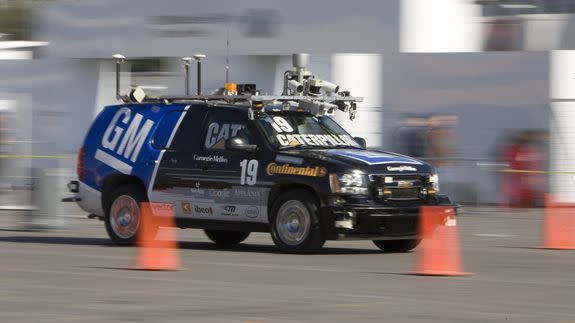Self-driving cars won't prevent road rage, study says

Every Tesla car may be self-driving by the end of next year, Elon Musk says — but that doesn't mean they're protected from road rage.
A new study conducted by Goodyear and the London School of Economics suggests some rogue drivers might be excited about "bullying" even autonomous vehicles. In fact, according to the study, some participants feel self-driving cars will be easier to mess with.
SEE ALSO: Apple doesn't need to build a car to get what it really wants
"People more open to [autonomous vehicles]... perhaps see [them] as easier agents to deal with on the road than other humans," a summary of the study said.
The study surveyed nearly 12,000 participants online across 11 countries. Participants were asked to assess how comfortable they feel about the prospect of a self-driving car on the road — which this study suggests is a "social space."
The study also assessed participants' "driver sociability" using a series of questions. Overall, drivers who are more "cooperative"on the road were less comfortable with the idea of self-driving cars according to the study.
One participant, who is not cooperative on the road, offered up this gem: “[The cars are] going to stop. So you’re going to mug them right off. They’re going to stop and you’re just going to nip round.” In British-speak that means, the self-driving car is going to actually stop when it's supposed to, and this driver is planning on taking advantage.
So, no matter how safe a self-driving car is, the reality remains that as long as there are are also human drivers neglecting the law and basic human decency, self-driving cars are still at risk of accidents. For example, a self-driving car may not be able to detect being cut off because it is assuming everyone else on the road is driving rationally and safely.
That is, until it is given a physical cue to assume otherwise.
For example, Google's self-driving car prototype knows to give a rogue driver the right of way, but it still doesn't know how to anticipate one approaching — which caused a minor bus accident earlier this year.
Still, 43 percent of study participants said they agreed that "most accidents are caused by human error, so autonomous vehicles will be safer." And 37 percent agreed that "machines don't have emotions, so they might be better drivers than humans."
However, since it'll be a long time before self-driving cars totally replace human drivers, they'll have to share the road. That might explain why 41 percent of surveyed drivers said they were "all levels of uncomfortable" driving alongside autonomous vehicles.
I don't blame them. It sounds like some human drivers are pretty excited to take advantage, which will only mean more tailgating.

 Yahoo News
Yahoo News 